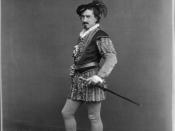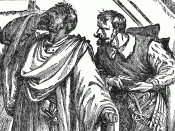In the play Othello by William Shakespeare change is represented not so much by its presence but by its absence. This play is about how an inability to change will bring about tragic consequences.
The main characters in Othello are Othello, Iago and Desdemona. All of these characters fail to change throughout the course of the play and consequently are the cause of their own downfall. The characters maintain their restricted attitudes throughout Othello.
Othello is a very narrow minded and simple character. It is as a direct consequence of his inability to change that he is able to be so easily manipulated by Iago. At the beginning of the play Othello states ÃÂFor since these arms of mineÃÂ their dearest action in the tented field; And little of this great world can I speak more than pertains to feats of broil and battle.ÃÂ Othello acknowledges his naivety and lack of knowledge of life.
ÃÂMy parts, my title, my perfect soulÃÂ Othello states when Iago informs him that Brabantio is coming to confront him. Alongside OthelloÃÂs self proclaimed naivety Othello also has a very idealized view of the himself, the world and love. It is a combination of all of these characteristics that ultimately lead to OthelloÃÂs downfall.
In Act 4 (the dungeon scene) Iago leads Othello to the cell and locks him in. This is an analogy. Othello is placed in a cage by Iago. Iago however did not create this cage, he merely takes advantage of the fact that one is already there, this is both literally and figuratively. OthelloÃÂs naivety and simplicity as a character is his figurative cage, Iago simply makes this apparent. Thus, within OthelloÃÂs character there is a lack of genuine change.
Iago is the essentially evil character of Othello. Iago states...
![From the Library of Congress: TITLE: Thos. W. Keene. Othello CALL NUMBER: POS - TH - 1884 .O7, no. 1 (C size) [P&P] REPRODUCTION NUMBER: LC-USZC6-58 (color film copy transparency) RIGHTS INFORMATION: No known restrictions on publication. MEDIUM: 1 print (](https://s.writework.com/uploads/9/94760/library-congress-title-thos-w-keene-othello-call-number-pos-thumb.jpg)

